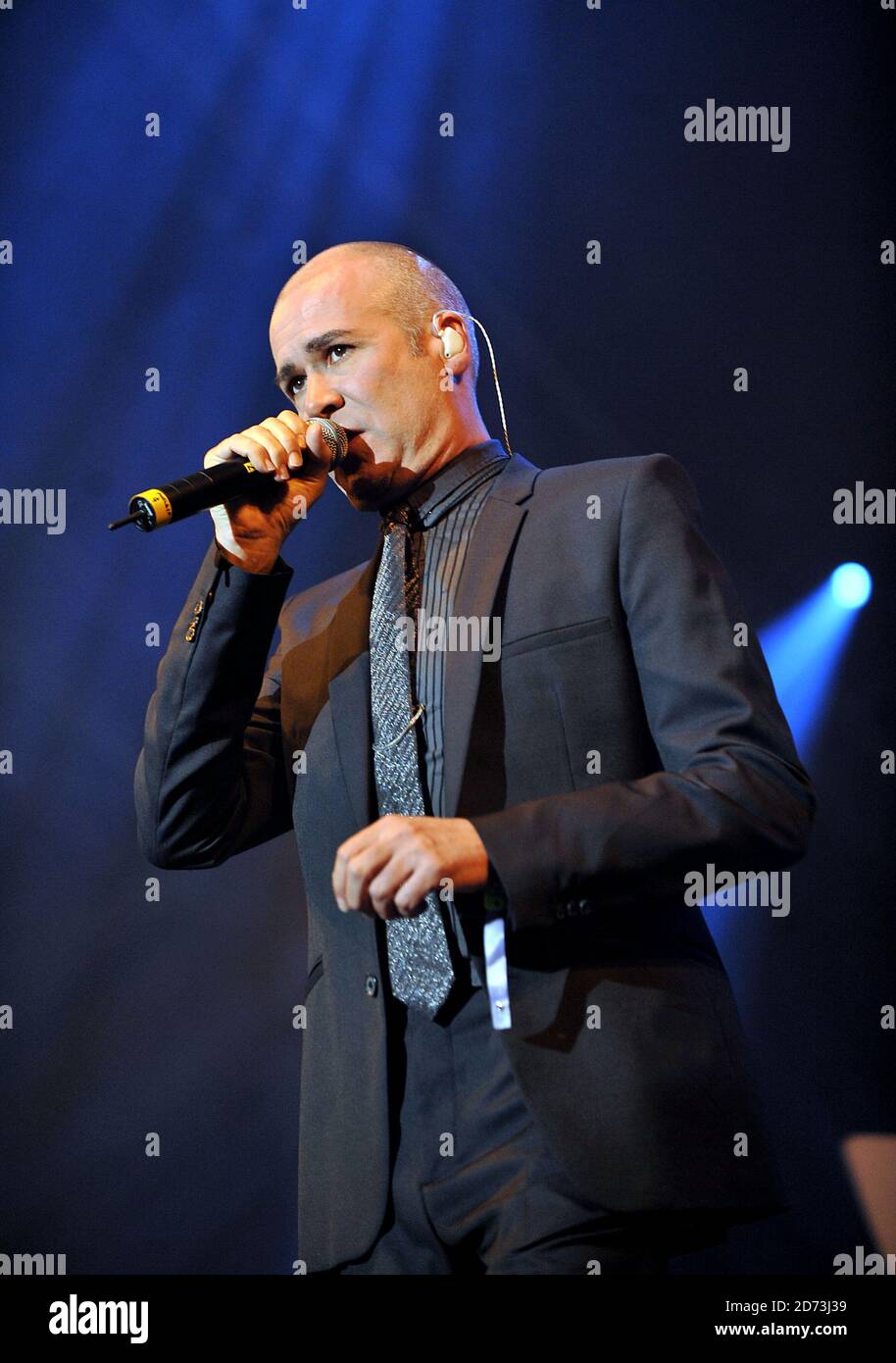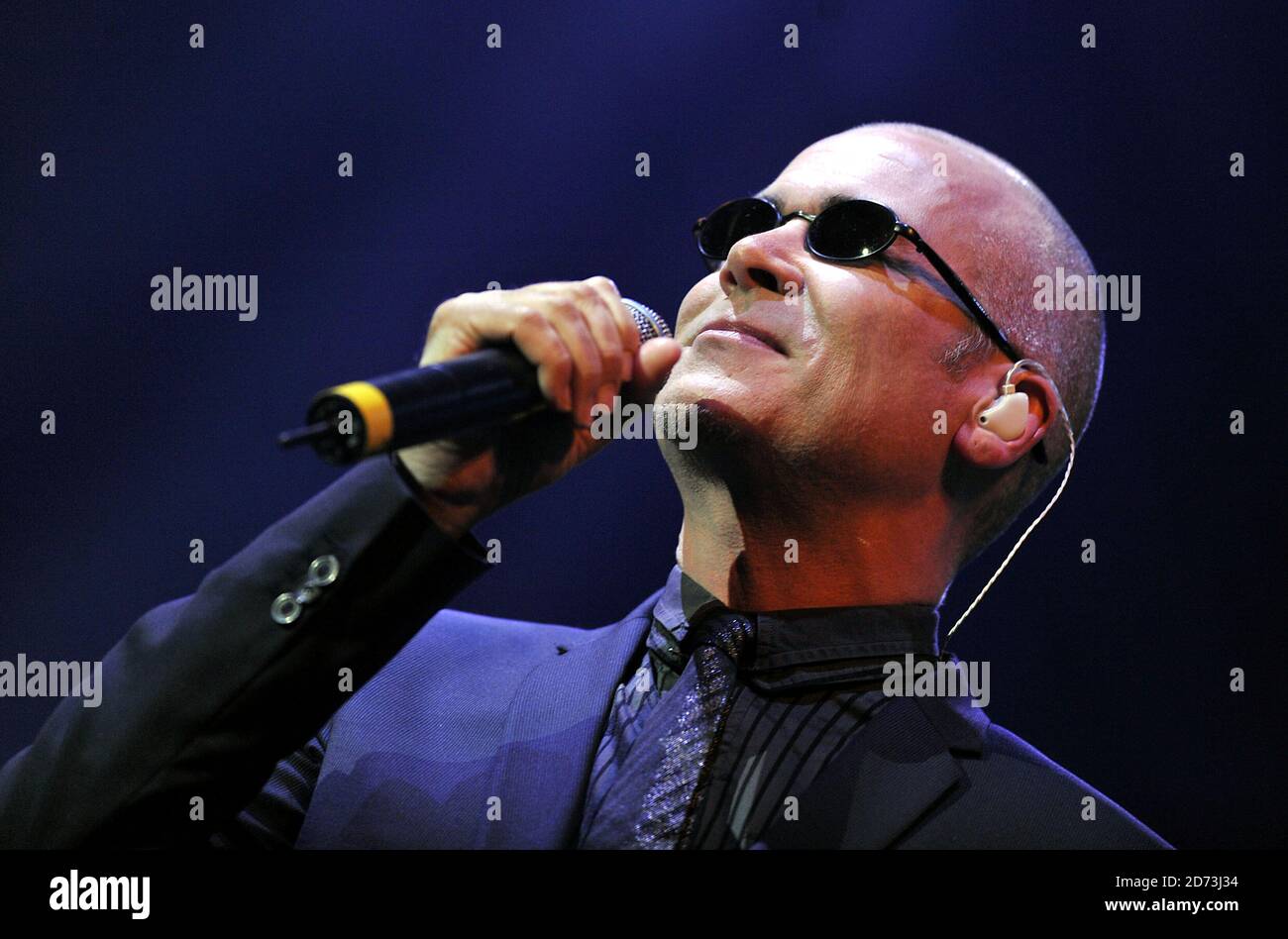Philip Oakey & The Human League: Synthpop Legend - Uncovered
Is it possible for a band, formed in the experimental crucible of the late 1970s, to not only survive but thrive for decades, influencing generations of musicians and captivating audiences worldwide? The enduring legacy of Philip Oakey, the visionary frontman of The Human League, provides a resounding and affirmative answer.
From the industrial heartland of Sheffield, England, emerged a sound that would redefine the landscape of popular music. The Human League, spearheaded by the enigmatic Philip Oakey, didn't just embrace synthesizers; they sculpted a sonic tapestry of futuristic melodies and evocative lyrics, establishing themselves as pioneers of the synth-pop genre. Oakey, born on October 2nd, 1955, initially harbored no ambitions of musical stardom. He found himself thrust into the spotlight, becoming the focal point of a band that would defy expectations and cement its place in music history. This transformation, from hospital porter to pop icon, is a testament to Oakeys unique vision and unwavering commitment to artistic expression.
| Attribute | Details |
|---|---|
| Full Name | Philip Oakey |
| Date of Birth | October 2, 1955 |
| Place of Birth | Hinckley, Leicestershire, England |
| Occupation | Singer, Songwriter, Producer |
| Known For | Lead singer, songwriter, and co-founder of the English synth-pop band The Human League |
| Band Formation | 1977, Sheffield, England |
| Notable Collaborations | Giorgio Moroder ("Together in Electric Dreams"), Various Artists |
| Solo Career | Extensive solo work |
| Key Albums (The Human League) | Dare, Reproduction, Travelogue |
| Key Singles (The Human League) | "Don't You Want Me", "Human", "Love Action (I Believe in Love)" |
| Musical Style | Synth-pop, New Wave, Electronic |
| Current Status | Continues to perform with The Human League |
| Associated Acts | The Human League, Giorgio Moroder, Various artists |
| Influences | Roxy Music, David Bowie and Glam Rock icons |
| Legacy | Influential figure in synth-pop, shaping the sound of the 1980s and beyond |
| Reference Website | The Human League Official Website |
The Human League's genesis, in the vibrant, post-punk atmosphere of late 1970s Sheffield, was an act of artistic defiance. With a lineup that initially included Martyn Ware and Ian Craig Marsh, the band set out to create music that was both innovative and emotionally resonant, built entirely upon the possibilities offered by synthesizers. Oakey, recruited by invitation reportedly, a note left on his door brought a unique perspective to the group. He had no prior experience in music, but he possessed an undeniable charisma and an intuitive understanding of the band's artistic direction, quickly establishing himself as the face and voice of the group.
- Discover Your Free Open Source Iot Device Management Solution
- Sean Paul Lockhart Brent Corrigan Movies Bio More
The early albums, such as Reproduction (1979) and Travelogue (1980), were critical successes, showcasing the band's avant-garde soundscapes and Oakey's distinctive vocal delivery. The band's exploration of electronic music created a sound world of their own, distinct from anything that had come before. It was a journey into the unknown, a bold artistic venture that pushed the boundaries of conventional pop music. Oakey's influence on the band was undeniable, his creative vision and artistic direction were pivotal in crafting their unique sound and aesthetic, while the early lineup of the band, including Ware and Marsh, experimented with sounds and styles.
The turning point, and arguably the pinnacle of their career, came with the release of Dare in 1981. This album, a sonic masterpiece, catapulted The Human League to international fame. The album's success was further cemented by the iconic single "Don't You Want Me". "Don't You Want Me" showcased Oakey's songwriting abilities and the bands innovative approach to music-making, becoming a global phenomenon. The songs narrative complexity and the accompanying video a relatively novel concept at the time sealed its place in pop history. The subsequent singles, "Love Action (I Believe in Love)" and "The Sound of the Crowd," further solidified the band's position at the forefront of the synth-pop revolution.
The success of Dare brought with it a new level of exposure. The Human League was everywhere, their music, their fashion, and Oakeys striking image. The band's blend of sharp synth melodies, Oakey's distinctive vocals, and the introduction of female vocalists Joanne Catherall and Susan Ann Sulley, discovered in a Sheffield nightclub, became the quintessential sound of the 1980s. This was not merely a band; it was a cultural phenomenon, a defining force in the development of pop music, whose influence continues to resonate today.
- Jon Lovitz Age Net Worth Snl Career Everything You Need To Know
- Jason Kylie Kelce Welcome Baby Finnley See The Sweet Details
However, the story of The Human League, and Philip Oakeys career, is not just one of unadulterated triumph. There were challenges and periods of creative uncertainty. The departure of Ware and Marsh soon after Dares release created a significant disruption, but Oakey, with his resolve, steered the band through these times. The band persevered, releasing albums and touring the world. The creative process evolved, as did the band's lineup, but Oakey's core vision remained constant. Oakey once admitted that by all rights, he should be driving a taxi, not fronting a pop band, which shows his humility and appreciation for the unpredictable nature of his career.
The mid-1980s saw the release of "Together in Electric Dreams", a song created in collaboration with Giorgio Moroder, further showcasing Oakey's ability to experiment and collaborate with other artists. This song, though often mistakenly attributed to The Human League, demonstrates Oakey's willingness to explore new musical territories and push creative boundaries. The association with Moroder, a giant of electronic music, enhanced Oakey's profile and underscored his reputation as a leading figure in the genre. This collaboration gave the singer the opportunity to further diversify the group's sound.
Over the years, The Human League have continued to evolve, adapting to changing musical landscapes while remaining true to their core principles. The bands later work, including their albums in the 1990s and beyond, showcased a more mature sound. Oakeys songwriting abilities matured with the passage of time. He continued to explore themes of love, loss, and the complexities of human relationships, always with a keen understanding of the power of melody and atmosphere.
The impact of Philip Oakey and The Human League extends far beyond record sales and chart positions. They have inspired countless artists and bands. The sound of the group resonated with a generation, and the band's innovative approach to music production had a profound influence on electronic music, from the development of synth-pop to the more modern electronic music styles. Oakey's distinctive vocal style, his image, and the bands pioneering use of synthesizers created a blueprint that many artists would follow.
Even today, The Human League continues to tour the world, playing to sold-out crowds who celebrate the band's enduring legacy. The music of the band, with its themes of aspiration, romance, and futuristic sounds, continues to resonate with new generations of listeners. Oakey, despite facing health challenges over the years, remains at the forefront, his voice as recognizable as ever. His commitment to his craft, his resilience in the face of adversity, and his creative spirit, have all combined to establish him as one of the most important figures in the history of pop music.
The enduring popularity of The Human League, nearly five decades after their formation in Sheffield, is a testament to the power of music to transcend time and connect with audiences on a deeply emotional level. The phone may still be ringing, as Oakey mentioned in various interviews, but more importantly, the music continues to connect, and the legacy of Philip Oakey and The Human League endures, solidifying their place as one of the most influential bands of the 1980s and beyond.
From Sheffields art scene to global stardom, Philip Oakey's journey is a powerful reminder of the transformative potential of art and the importance of staying true to ones creative vision. His story is a testament to the enduring power of music, a story that continues to unfold, one synth-driven song at a time.
- Jennifer Syme Her Life Before Keanu Reeves Unveiled
- Francis Escudero Net Worth 2024 How Rich Is The Politician

Phil Oakey of The Human League performing on the eve of the first day of the Isle of Wight

Phil Oakey of the Human League Popular music artists, Human, Popular music

Phil Oakey of The Human League performing on the eve of the first day of the Isle of Wight